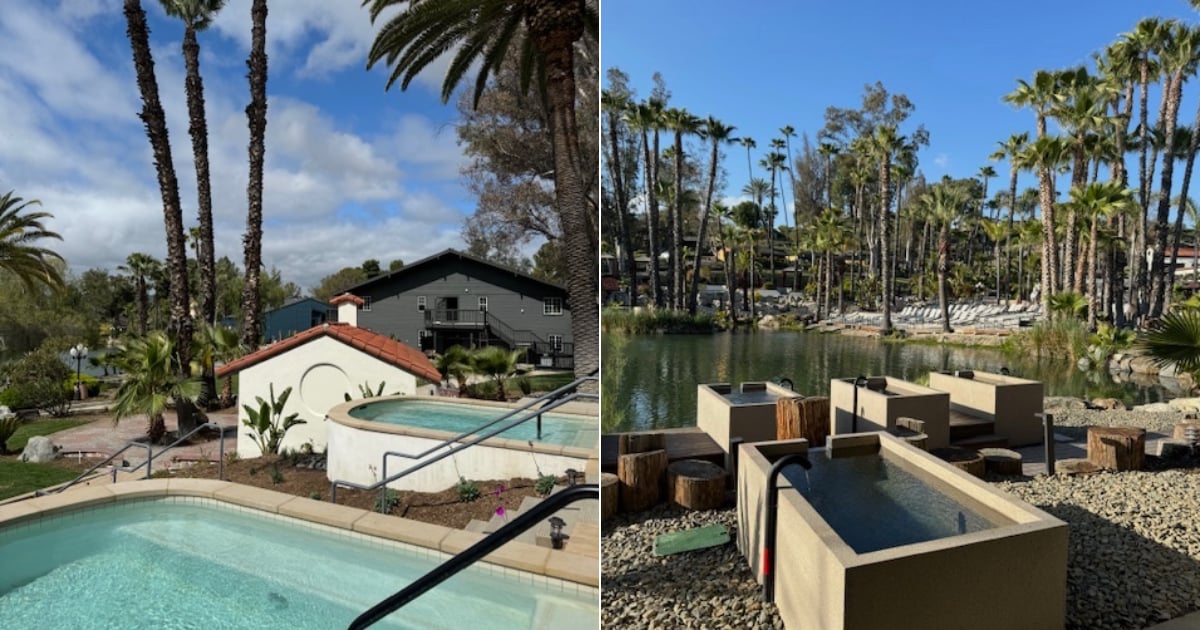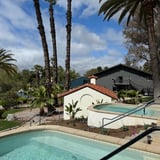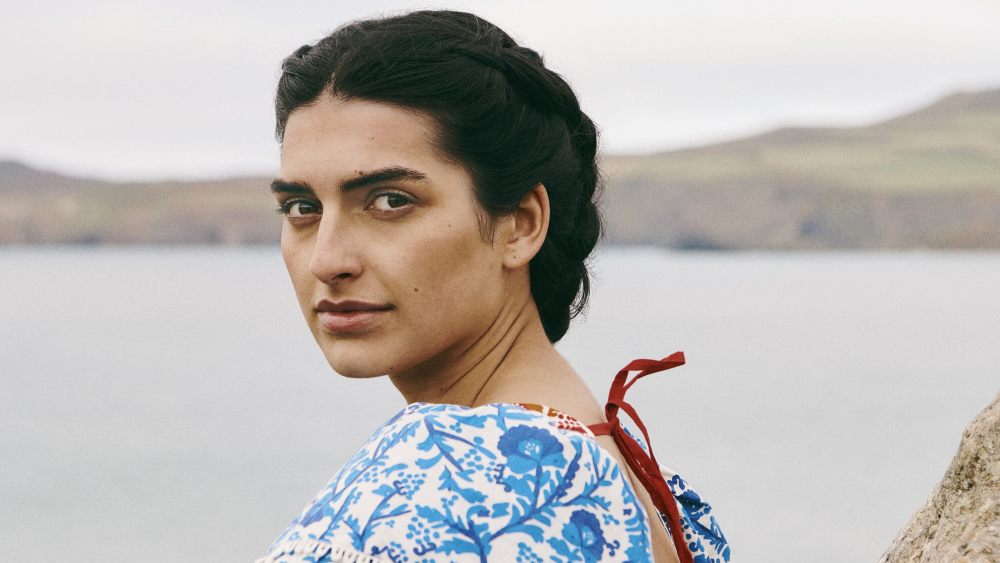Humans have been bathing in hot springs for centuries to treat a variety of health concerns, ranging from skin conditions to mental health. According to Marcus Coplin, ND, a primary care naturopathic medical doctor, health seekers traditionally visit healing springs for several days to a few weeks, incorporating regular geothermal mineral water baths into their stay – something we kind of wish our employers would adopt as an out-of-office policy.
As someone with anxiety, there’s nothing I love more than a relaxing and recovery treatment, especially when it includes benefits like moisturizing and softening dry, rough, and xerotic skin. So, I took a trip to Murrieta to see if the mineral-rich hot springs were worth the hype (spoiler alert: they are!). Keep reading to learn more about my experience, what to know before you go, and how to enjoy some of these hot spring benefits at home.
Experts Featured in This Article
Marcus Coplin, ND, is a primary care naturopathic medical doctor and medical director of Murrieta Hot Springs Resort in southern California.
Nava Greenfield, MD, is a board-certified dermatologist.
What Are the Beauty Benefits of Hot Springs?
Balneology, the study of the effects and mechanisms of geothermal bathing, identifies three key elements of a hot spring soak that contribute to its health benefits, aka balneotherapy.
Thermal: Dr. Coplin explains that the heat energy from hot springs activates a range of beneficial biochemical processes in the body. As the body works to regulate its temperature, the increased circulation promotes several adaptive effects, including the production of Heat Shock Proteins (HSPs). These proteins are crucial for strengthening and repairing cell function, helping to counteract chronic damage. Additionally, the heat triggers genetic signals that neutralize oxidative damage caused by free radicals (which can come from inflammation, environmental factors, and even your diet).
Physical: “Floating in water creates an anti-gravity-like effect,” says Dr. Coplin. “This signals the brain to release tension in many major muscle groups that support our posture.” Less muscle tension can lead to overall deep relaxation, something we could all enjoy more often. The pressure from being surrounded by water, which he refers to as the “blanketing effect,” positively impacts the circulatory system by easing blood pressure, facilitating lymph movement, and enhancing waste removal through the kidneys.
Mineral: According to Dr. Coplin, the minerals found in hot springs – which originate from the rocks and sediments the water hits as it travels up to the Earth’s crust – are the key element that distinguishes natural hot springs from other types of balneotherapy. “The mineral components [provide] antioxidants, increase anti-inflammatory effects, offer joint protection, and provide pain relief.”
While most mineral springs benefit the skin, sulfur wears the crown as it is particularly effective for inflammatory skin conditions. Dr. Coplin explains that sulfur acts as a mild mechanical stimulant, enhancing circulation, reducing inflammation, and promoting healthy skin cell production. However, he notes that, “This mineral gives many hot springs their earthy or ‘matchstick’ smell, which some may find acquired.”
Board-certified dermatologist Dr. Nava Greenfield, MD, explains that sulfur is often used in dermatology for its soothing properties and can help calm inflammation from conditions like eczema and psoriasis. It’s so beneficial that some countries, like Germany, Hungary, and Austria, even allow doctors to prescribe hot spring bathing to treat inflammatory skin conditions. “It can provide significant relief from chronic symptoms without the need for anti-inflammatories or other suppressive medications,” says Dr. Coplin.
My Hot Springs Experience
As a disciple of Gwyneth Paltrow, I always wanted to visit a hot spring, so when the opportunity arose to visit Murrieta and experience the natural healing waters, I couldn’t refuse. My skin is typically very dry and scaly, so I was especially excited to see if I would notice a difference after a few days in the various pools. And boy, did they offer variety. The property featured hot springs at different temperatures, cold plunges, and even chlorine pools for those who prefer not to partake. Plus, there were saunas and mud baths, so once my skin turned pruney, I could keep the wellness vibes going.
While the composition of the water varies depending on where you go, the water at Murrieta Hot Springs Resort is an alkaline saline spring, lightly sulfured and rich in silky silica, which is great for healthy, glowing skin. It also contains potassium, lithium, and bicarbonate, which nourish and balance the nervous system – excellent for fried nerves and burnout, something I experience regularly. My only minor drawback is that you might notice a smell depending on the spring. The water at Murrieta contained a good amount of sulfur, so there was a hint of an egg scent in the air, but that’s the cost of going au naturel.
I spent three days alternating between the different waters, ignoring my Slack messages, and lounging by the pool. Safe to say, my skin was much softer by the end, and I felt more zen than when I arrived, which was a miracle for me. I did need to wash my swimsuits a few times to get the scent out, but it was well worth it.
Can You Replicate the Benefits of Hot Spring at Home?
Dr. Coplin explains that although nothing compares to the experience of natural hot springs, salt soaking kits, like Epsom salts, can offer similar benefits, even if they can’t replicate the unique, organic components of natural geothermal waters (including therapeutic gasses and other elements). “Soaking in Epsom salt at home is a great way to relax sore muscles. With enough salts added to the bath, you can get good magnesium delivery directly to the muscles, which helps reduce chronic tension, aches, and pains,” he says. And while Dr. Greenfield hasn’t fully endorsed at-home kits due to limited studies, she believes they can be beneficial for the skin and your general relaxation.
If you don’t have access to a tub at home, Dr. Coplin suggests taking a contrast shower, or alternating between hot and cool or cold water, for 30 to 90 seconds per cycle. He explains that this process can strengthen the immune system, making you less likely to get sick. It also improves blood flow, which nourishes the skin, giving you a healthy glow, and helps to regulate your metabolism. Additionally, the nerve-balancing effects of contrast bathing can enhance mental clarity and emotional well-being.
To do a contrast shower at home, use the showerhead to direct the water toward your heart, allowing it to flow over you for three temperature change cycles, finishing with a cold cycle. Dry yourself vigorously afterward; after a week, the surprise of cold water might even become enjoyable. “If done regularly, it can harness the therapeutic effects of water into a self-care health routine,” says Dr. Coplin.
Are Hot Springs Worth the Trip?
Overall, soaking in natural geothermal water can kick start several processes in your body, enhancing your overall health and wellness. These include reducing inflammation, neutralizing oxidative stress, balancing hormonal signals, initiating cellular repair, and aiding in waste elimination (I haven’t gotten sick in some time – not to jinx it!). According to Dr. Coplin, a single 20-minute soak begins these processes, and the more frequently you repeat the soak, the longer-lasting the effects will be. He recommends taking a dip 2-3 times during a day-long stay or multiple times daily for up to a 10-day stay. “Just like any exercise, one session at the gym is good, but a regular routine is what builds fitness,” he says.
If you have any reservations, consult your board-certified dermatologist before booking a trip, and avoid the waters if you have an active skin infection, open wound, or burn. And while Dr. Greenfield notes that consistent hot spring use is not essential for maintaining healthy skin, she considers it a luxury worth enjoying if possible. I couldn’t agree more.
Iman Balagam is a freelance journalist and brand consultant who specializes in beauty, fashion, and lifestyle content. The Texas native’s work has appeared in a variety of publications, including Vogue, Allure, and Elle.


